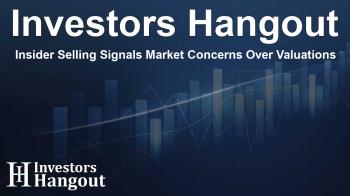Insider Selling Signals Market Concerns Over Valuations

Understanding Insider Transactions in Today's Market
As the summer months progressed, the stock market saw a steady increase; however, corporate insiders began to show signs of unease. In July, less than a third of companies within the S&P 500 reported stock purchases by insiders. This alarming statistic marks the lowest level of insider buying since 2018.
Additionally, the insider buying to selling ratio has nearly halved compared to its long-term average, representing the second-lowest level recorded in the past four years. According to a report, corporate insiders' reluctance to buy stocks suggests a potential discrepancy between their expectations and those of optimistic market analysts.
Dave Mazza, CEO of Roundhill Investments, highlighted this cautious behavior saying, “Corporate executives are behaving a lot like institutional investors right now: cautious, conservative, and valuation-sensitive.” He further pointed out, “The people that know the most about companies are telling you that much of the good news is discounted.” This hints at an underlying fear regarding the sustainability of current market levels.
The Implications of Insider Behavior
Insiders possess a deeper knowledge of their companies compared to the average investor. Therefore, observing their actions can provide valuable insights into market sentiments. The recent trend of increasing insider selling combined with a noticeable lack of buying could signal a growing skepticism among corporate leaders regarding future growth prospects.
While insider trading can serve as an advisory beacon, it is essential for investors not to overreact. Although insiders tend to have better knowledge, their buying and selling patterns do not always predict market movements accurately. High valuations coupled with economic uncertainties and technically overbought conditions present valid reasons for caution, yet overreactions might lead to misguided investment strategies.
Rate Cut Speculations Ahead of Upcoming FOMC Meeting
Amidst these concerns, noteworthy developments at the Federal Reserve are stirring discussions regarding potential rate cuts. Fed Governor Adriana Kugler’s unexpected departure from her post has implications for future monetary policy. Her exit leaves a vacancy that President Trump is expected to fill imminently, and the new Governor will have a significant vote at the mid-September Federal Open Market Committee (FOMC) meeting.
This change in leadership is crucial because the new appointee is likely to align with President Trump and the dissenting opinions of the last FOMC meeting, advocating for immediate rate cuts. Potential nominees for this position include prominent figures like former Fed Governor Kevin Warsh or current member Christopher Waller, both of whom have been discussed as front-runners in economic leadership circles.
The recent employment data releases, alongside their notably revised figures, have heightened expectations for a rate cut in September. The new Governor's voting presence could further amplify those prospects.
Market Expectations for Interest Rate Adjustments
Current market forecasts indicate that investors are bracing for a 25 basis point cut at the upcoming meetings, with a projection that would lower the Fed Funds rate to a range of 3.50-3.75%. Such adjustments may signal a response to ongoing economic pressures and a critical evaluation of inflationary trends.
Frequently Asked Questions
What does a decline in insider buying indicate?
A decline in insider buying may indicate that corporate executives are cautious about their companies' future performance, reflecting concerns over high valuations and market stability.
How does insider selling relate to market trends?
Insider selling can signal market trends, as insiders typically have intimate knowledge of their company’s operations and may act on perceived misvaluations or red flags in the market.
What is the significance of the FOMC meeting?
The FOMC meeting is significant as it sets monetary policy, including interest rates, which directly influences economic conditions, investment environments, and market performances.
How might rate cuts affect the economy?
Rate cuts can stimulate economic growth by lowering borrowing costs, encouraging consumer spending, and promoting business investments, but also carry risks like increased inflation.
What are the market's expectations for future interest rates?
Market expectations currently suggest a steady trajectory of interest rate cuts in the near term, aiming to support economic recovery and manage inflation levels.
About The Author
Contact Henry Turner privately here. Or send an email with ATTN: Henry Turner as the subject to contact@investorshangout.com.
About Investors Hangout
Investors Hangout is a leading online stock forum for financial discussion and learning, offering a wide range of free tools and resources. It draws in traders of all levels, who exchange market knowledge, investigate trading tactics, and keep an eye on industry developments in real time. Featuring financial articles, stock message boards, quotes, charts, company profiles, and live news updates. Through cooperative learning and a wealth of informational resources, it helps users from novices creating their first portfolios to experts honing their techniques. Join Investors Hangout today: https://investorshangout.com/
The content of this article is based on factual, publicly available information and does not represent legal, financial, or investment advice. Investors Hangout does not offer financial advice, and the author is not a licensed financial advisor. Consult a qualified advisor before making any financial or investment decisions based on this article. This article should not be considered advice to purchase, sell, or hold any securities or other investments. If any of the material provided here is inaccurate, please contact us for corrections.

